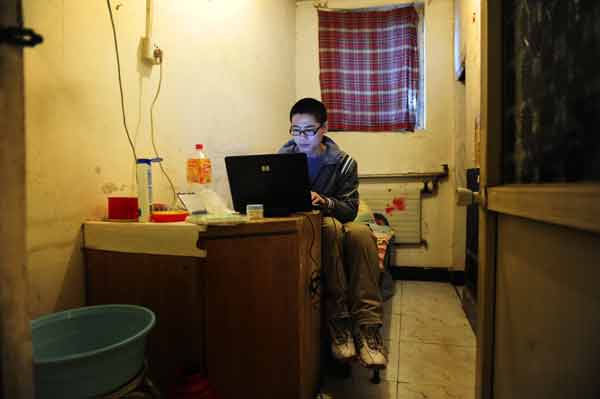Society
College grads set up camp near campus
By Wang Yan (China Daily)
Updated: 2011-02-11 07:39
 |
Large Medium Small |
 |
|
Jiao Wenjun, a college graduate from Shanxi province, rented this room outside Tsinghua University (2010 photo). He found it convenient to use the dining hall and library and attend classes free. YIN YAFEI / FOR CHINA DAILY
|
"A too-high expectation from parents could be a burden on students, and could prevent them from returning home after graduation. Many would not tell parents their real situation."
In Ye's case, his mother died in 2009 and his father is essentially estranged. His married sisters occasionally support him, but they want him to get a job.
"They thought a bachelor's degree should be enough to get a decent job," Ye said.
Fewer job options
Based on Hu's research, school-drifters appeared as early as the 1980s. The State still allocated jobs for college graduates then, but it wasn't enforceable: The graduate or the employer could decide not to sign the contract. If that happened, most of the unemployed graduates returned to their colleges and waited for the next round of allocation. But there weren't many who did this, and they stayed on campus for just a few days.
An upsurge occurred in 1997, when the country launched the State-owned enterprises reform. Those enterprises had been the first choice of many career-starters, but they were hiring fewer graduates. Plus, the doorsills of foreign companies were still too high for new graduates, and private Chinese companies were still of low status.
As a result, many graduates felt lost, and the number who stayed in school - for further education, for better opportunities, or for the comfort - increased.
By 2003, colleges graduated the first group of students under a State push to increase higher education rates. Add that to layoffs by State-owned companies and the usual flood of migrant workers, and a tight job market reached a new peak.
A State policy issued in March 2002 said unemployed graduates could keep their hukou (household registration) in the schools for two more years. And many did, choosing to drift.
Unrealistic?
Hu listed score-oriented education as one cause of school-drifting. "It is not doing well in connecting with the real world."
Primary and middle school education makes good exam performance the only aim of students. Without fully following their interests when choosing majors, coupled with inflexible major transfers, many students are just stuck studying things they're not interested in, Hu said.
"Moreover, career education is not yet treated with high importance. Many just think it's not a big deal compared to academic education."
Ye, from Shaoguan University, agreed.
"I majored in administrative management as an undergraduate. The courses were too theoretical and I often skipped classes. Finding a job is hard. Some of my classmates just work at a shopping mall selling cell phones, making only 1,800 yuan a month," he said.
"We're not competitive enough in the job market, even worse than some vocational schools."
Students, however, should also take some responsibility, Hu said.
Many hope their first jobs will bring everything, and some unrealistically compare themselves with their peers. Once unsatisfied, they look for ways out, and pursuing further studies becomes a popular option.
Statistics from the Ministry of Education show that the number of applications for the postgraduate exam in 2011 reached 1.5 million, a 7 percent annual increase.
Competition is fierce, though; only about one in three will make the cut.
A higher degree is commonly believed to lead to higher pay.
MyCos, a third-party education statistics consulting and evaluation agency, released a report in late October last year on wages for the Class of 2011. Based on 20,829 interviews, the average monthly pay was 4,160 yuan for advanced degree graduates, 2,514 yuan for undergraduates and 2,077 yuan for vocational school graduates.
The report also noted that those employed as early as October, for jobs they will begin after graduation in June, were more competitive and their wages were higher.
| 分享按钮 |